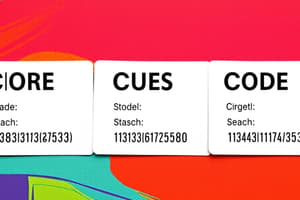Podcast
Questions and Answers
Match the following equations with their corresponding geometric representation:
Match the following equations with their corresponding geometric representation:
y = mx + c = A straight line in the xy-plane r = p + tv = A line in 3D space d = \sqrt{(x2 - x1)^2 + (y2 - y1)^2} = Distance between two points in a plane \left(\frac{x1 + x2}{2}, \frac{y1 + y2}{2}\right) = Midpoint of a line segment
Match the following concepts with their definitions:
Match the following concepts with their definitions:
Cartesian coordinates = A pair of numbers determining the position of a point in a 2D or 3D space Slope of a line = The inclination of a line with respect to the x-axis Locus of points = The set of all points satisfying a given condition or property Orthogonal circles = Circles intersecting at right angles
Match the following geometric properties with their definitions:
Match the following geometric properties with their definitions:
Parallel lines = Lines with the same slope Perpendicular lines = Lines with slopes whose product is -1 Midpoint formula = Formula for finding the midpoint of a line segment Distance formula = Formula for calculating the distance between two points
Match the following terms with their characteristics:
Match the following terms with their characteristics:
Signup and view all the answers
Study Notes
A Level Pure Maths: Coordinate Geometry
Cartesian Coordinates
Cartesian coordinates, also known as rectangular coordinates, are a pair of numbers that uniquely determine the position of a point in a two-dimensional plane or a three-dimensional space. The coordinates are usually written as (x, y) in the plane and as (x, y, z) in 3D space.
Equation of a Line
The equation of a line in the xy-plane can be written in the form y = mx + c, where m is the slope of the line and c is the y-intercept. In 3D space, the equation of a line is given by the vector equation r = p + tv, where p and q are points on the line, and t is a parameter.
Distance Between Two Points
The distance between two points (x1, y1) and (x2, y2) in a two-dimensional plane is given by the distance formula:
$$ d = \sqrt{(x2 - x1)^2 + (y2 - y1)^2} $$
Midpoint Formula
The midpoint of the line segment connecting two points (x1, y1) and (x2, y2) is given by the midpoint formula:
$$ \left(\frac{x1 + x2}{2}, \frac{y1 + y2}{2}\right) $$
Parallel and Perpendicular Lines
Two lines are considered parallel if they have the same slope, and they are perpendicular if the product of their slopes is -1.
Locus of Points
The locus of points is the set of all points that satisfy a given condition or property. For example, the locus of points equidistant from two given points is a circle.
Orthogonal Circles
Two circles are said to be orthogonal if they intersect at right angles. In the Cartesian plane, two circles are orthogonal if their equations are of the form:
$$ (x - h)^2 + (y - k)^2 = r^2 \quad \text{and} \quad (x - p)^2 + (y - q)^2 = s^2 $$
Parametric Equations of a Circle
The parametric equations of a circle with center (a, b) and radius r are given by:
$$ x = a + r\cos t \quad \text{and} \quad y = b + r\sin t $$
where t is the parameter, which varies from 0 to 2π.
Tangents to a Circle
A tangent to a circle is a line that touches the circle at exactly one point. The equation of a tangent to a circle with center (h, k) and radius r at a point (x, y) is given by:
$$ (x - h)^2 + (y - k)^2 = r^2 \quad \text{and} \quad x - h = r\sin t $$
where t is the parameter, which varies from 0 to 2π.
Studying That Suits You
Use AI to generate personalized quizzes and flashcards to suit your learning preferences.
Description
Test your knowledge of Cartesian coordinates, equation of a line, distance between two points, midpoint formula, parallel and perpendicular lines, locus of points, orthogonal circles, parametric equations of a circle, and tangents to a circle in coordinate geometry.




